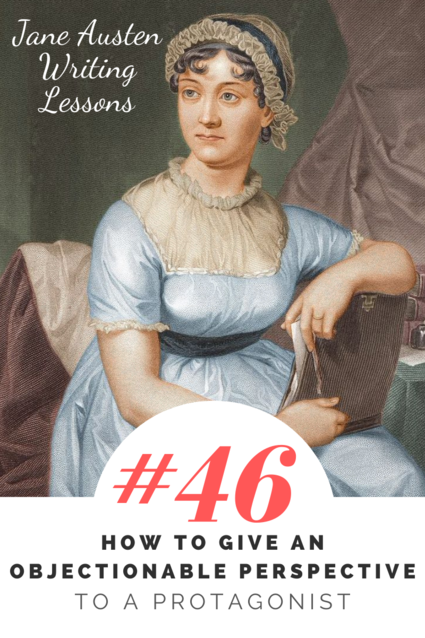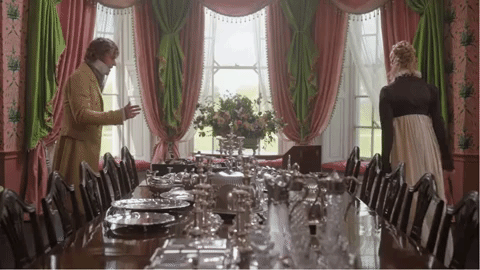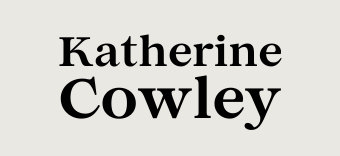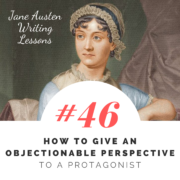Full Sized Blog Element (Big Preview Pic)
#46: How to Give an Objectionable Perspective to a Protagonist
/0 Comments/in Jane Austen Writing Lessons/by Katherine Cowley
Often, objectionable opinions—ones the author strongly disagrees with—are assigned to antagonists: if the perspective belongs to an antagonist, it is easy to represent it without condoning it.
Yet our protagonists should not be perfect people—they need flaws and weaknesses, and sometimes even objectionable perspectives that actively cause harm to others.
An example of this is Emma, the title character and protagonist of Jane Austen’s novel Emma. She is the protagonist, and while at times the narrator makes commentary on her, the narrative voice generally leans into her perspective.
Emma is clever, handsome, and rich. She has a dominant, influential position in her society. She also holds objectionable viewpoints on who has value; she believes her perspective is always superior to that of anyone else; she is judgmental, classist, and self-centered.

So how do you give an objectionable perspective to a protagonist?
1. Understand your character’s views and the reasons for their views and behaviors
In last week’s lesson, we discussed the importance of understanding your character’s views, even—and especially—when you disagree with them. This is also essential when a protagonist holds objectionable perspectives, and when these objectionable perspectives lead to negative behaviors.
After giving a little background on Emma’s character and situation, the narrator helps us understand the reasons for Emma’s perspectives:
The real evils, indeed, of Emma’s situation were the power of having rather too much her own way, and a disposition to think a little too well of herself; these were the disadvantages which threatened alloy to her many enjoyments. The danger, however, was at present so unperceived, that they did not by any means rank as misfortunes with her.
This does not necessarily absolve Emma of her approach, but it does help us understand her.
2. Craft an unreliable narrator
An unreliable narrator is one who cannot give us a full perspective—or chooses not to. When using a close third person point of view (as much of Emma does), or when writing in first person, readers are given the story through a character’s lens. No character can see the big picture—every character is limited by their experiences, their knowledge, and their interactions with other. If the character has an objectionable perspective, this can make them even more unreliable: everything they see or experience will be filtered through that perspective and their understanding of the world.
This happens constantly in the novel Emma. Emma has disliked (and been jealous of) Jane Fairfax since childhood. When Jane Fairfax returns to Highbury, Emma is forced to renew their acquaintance. In the following passage, we can see her making judgments on Jane—both positive and negative. We can also see her coming to conclusions about Jane being in love with Mr. Dixon, who happens to be the husband of Jane’s best friend. The evidence provided throughout the novel supports that conclusion—because it is filtered through Emma’s perspective. Yet Emma is completely wrong in this judgment, and this interpretation of events is used by Emma to cause harm to Jane later. Here’s a passage describing part of Emma and Jane’s first visit after Jane’s return:
In short, [Emma] sat, during the first visit, looking at Jane Fairfax with twofold complacency; the sense of pleasure and the sense of rendering justice, and was determining that she would dislike her no longer. When she took in her history, indeed, her situation, as well as her beauty; when she considered what all this elegance was destined to, what she was going to sink from, how she was going to live, it seemed impossible to feel any thing but compassion and respect; especially, if to every well-known particular entitling her to interest, were added the highly probable circumstance of an attachment to Mr. Dixon, which she had so naturally started to herself. In that case, nothing could be more pitiable or more honourable than the sacrifices she had resolved on. Emma was very willing now to acquit her of having seduced Mr. Dixon’s actions from his wife, or of any thing mischievous which her imagination had suggested at first. If it were love, it might be simple, single, successless love on her side alone. She might have been unconsciously sucking in the sad poison, while a sharer of his conversation with her friend….
An unreliable narrator is powerful because it invites us to embrace the perspectives—we cannot help doing it, at least to an extent—and yet we gradually realize, as we read, that the narrator is unreliable, which can lead us question the validity of their perspectives.

3. Incorporate a voice that disagrees
If a character has an objectionable perspective, there should always be another character that disagrees with them. Sometimes this disagreeing character takes on the perspective of the author; at other times, this disagreeing character provides other viewpoints which may not represent the author’s perspective, yet still oppose that of the main character.
No matter what time period, no matter what group of people, in real life there has always been someone who has disagreed with objectionable perspectives, even when those perspectives seem almost universal.
In the novel Emma, because Emma is in a place of power and privilege in her community, almost no one will voice any opposition to her. This includes people that could or should oppose some of her viewpoints or behaviors, people like Emma’s father, or her former governess, who did not voice disagreement or objection even when acting as a governess.
Yet despite Emma’s power, there is still a character willing to criticize Emma and point out the flaws in her perspective: Mr. Knightley.
After Emma convinces Harriet to turn down Mr. Martin’s proposal, Emma has a discussion with Mr. Knightley.
Mr. Knightley confides in Emma that Harriet may soon be receiving an offer of marriage, and Emma explains that the offer has already happened, and that Harriet declined via a letter.
Mr. Knightley is shocked:
“You saw her answer!—you wrote her answer too. Emma, this is your doing. You persuaded her to refuse him.”
“And if I did, (which, however, I am far from allowing) I should not feel that I had done wrong. Mr. Martin is a very respectable young man, but I cannot admit him to be Harriet’s equal; and am rather surprized indeed that he should have ventured to address her. By your account, he does seem to have had some scruples. It is a pity that they were ever got over.”
“Not Harriet’s equal!” exclaimed Mr. Knightley loudly and warmly; and with calmer asperity, added, a few moments afterwards, “No, he is not her equal indeed, for he is as much her superior in sense as in situation. Emma, your infatuation about that girl blinds you.”
Mr. Knightley then continues with another 298 words of criticism. Emma presents counterarguments and Mr. Knightley returns in kind.
Emma is not convinced by Mr. Knightley’s arguments—she does not really listen to them, and it does not change her perspective or behavior. Yet despite that, it is a key part of Mr. Knightley’s character to oppose her, and it is essential for Emma to know that her perspective is not universally shared and that others may see it as flawed.
Having an alternative perspective invites the reader to see the flaws in the objectionable perspective. It also sets up the main character for either growth or tragedy.

Emma and Mr. Knightley arguing in the 2020 film Emma.
4. Create an opportunity for growth or tragedy
Giving a character an objectionable perspective for growth or change—if the character realizes the problems with their perspective, they have the possibility for a powerful character arc as they transform and become someone better.
If they choose not to transform, then it opens the door for tragedy, in which the readers and the character experience the consequences of not changing.
Throughout the novel, Emma hurts many characters including Mr. Martin, Mr. Elton, Jane Fairfax, Harriet Smith, and Miss Bates. It is when she insults and hurts Mrs. Bates at Box Hill that she begins to feel guilt for her behavior (and Mr. Knightley criticizes Emma’s behavior, not allowing her to brush it off).
The next chapter begins:
The wretchedness of a scheme to Box Hill was in Emma’s thoughts all the evening. How it might be considered by the rest of the party, she could not tell. They, in their different homes, and their different ways, might be looking back on it with pleasure; but in her view it was a morning more completely misspent, more totally bare of rational satisfaction at the time, and more to be abhorred in recollection, than any she had ever passed.
At this point, Emma could continue to act as she has—assuming her perspective is superior and justifying her actions. Yet instead, she goes to visit Miss Bates, and for once she is truly interested in Miss Bates’ conversation and appreciative of Miss Bates’ virtues.
There is still regression for Emma—still opportunities when her harmful perspectives come into play and she risks a tragic ending—but ultimately she begins to transform and heal some of the damage she has done.
Endowing Emma with objectionable perspectives gave her great opportunities throughout the novel. By the end, she’s still a bit classist, still overconfident at times, but some of her core problematic perspectives have shifted.
Note: There are characters who do not grow, and yet do not suffer tragedy, such as Jane Austen’s title character in Lady Susan.
Conclusion
Giving a protagonist an objectionable perspective can be a powerful tool, and you can give them this perspective without condoning it.
In the next lesson I’ll discuss how characters justify their behavior, especially when it’s negative behavior.

Exercise 1: Write a scene from the perspective of an unreliable narrator, where their viewpoint taints or colors their interpretation of the world around them. Give one or two clues to the reader that this perspective may be unreliable.
Exercise 2: Make a list of characters or protagonists you like (from any storytelling medium) and their viewpoints or perspectives that you disagree with. Consider why you like these characters despite disagreeing with them.
Book Unboxing Video for The True Confessions of a London Spy
/0 Comments/in Secret Life of Miss Mary Bennet/by Katherine CowleyI have a confession to make.
I love snow.
Not the “it’s March and it’s been snowing non-stop for five months and my car just slid off the road” snow. But in general, I love snow. Watching it fall, bundling up and walking through a snow-filled forest, making snow angels with my kids, drinking hot cocoa next to a fire with snow falling outside the window.
Mary Bennet doesn’t necessarily feel so positively about snow. In January and February of 1814 London received feet of snow (at one point, there were mounds of snow five feet high). It got so cold that the Thames River froze over and an ice fair was held on it. Which all is part of my book The True Confessions of a London Spy.
My advance copies of The True Confessions of a London Spy arrived, so I just had to unbox them in the snow.
The weather is practically a character in the book. Here’s a short excerpt of the first few chapters which gives a feel for the book and a taste of the snow:
When Miss Mary Bennet agreed to become a spy for the British government, she had not realised how many dead bodies the job would entail. True, since accidentally discovering a corpse on the beach in Worthing she had not seen any additional individuals bereft of life, but now she was headed to London for her first time in an official capacity, and she already had an appointment to call upon a corpse.
The carriage windows fogged with the warmth of their breaths. Despite pressing her feet against a hot rock, Mary’s toes felt frigid. She shifted closer to Fanny, one of her fellow spies, to better share the blanket they held over themselves. The other inhabitant of the carriage, a spy named Mr. Withrow, rubbed his gloved hands together.
Snow continued to fall outside the carriage, adding to the piles already on the London streets. A man stood on a roof, pushing at the two or three feet of accumulated snow. It fell heavily onto the walk and road below, to the anger of a couple who had walked into the snow shower.
The book comes out on March 1, 2022, but it is now available for preorder–links are on the main page on my website for The True Confessions of a London Spy. Preordering helps show initial support for the book and makes sure that the publisher prints enough copies.
And now, I should get back to editing book 3 in the series, which comes out late next year.




